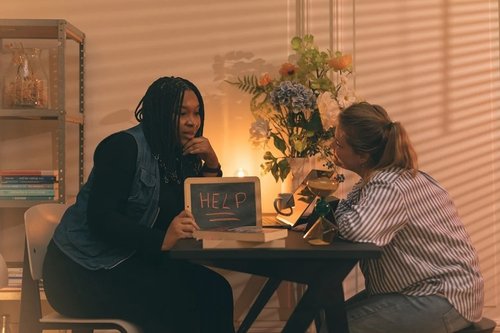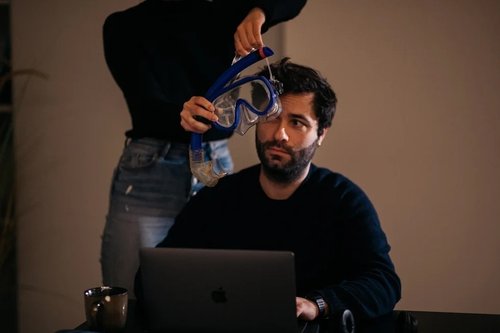Australia mandates paid leave for domestic violence survivors
Jun 08, 2023
5 mins


Journaliste basée à Melbourne
Should companies assist employees who are survivors of domestic violence? Many feel that work, a guarantee of financial independence, is crucial for leaving controlling, abusive relationships. Employers, therefore, should be involved — or so believes the government of Australia, which recently became one of the world’s first countries to mandate 10 days paid leave for domestic violence survivors.
Although the move has been widely lauded, some small businesses don’t share the sentiment. Here’s a look at the law causing both debates and newfound initiatives. “When I learned that the law offering 10 days paid leave for domestic violence victims had been passed, I felt it was a pivotal moment. It really gave me hope,” says Jacque Lachmund, who survived domestic violence 19 years ago. Recognizing gender-based violence, however, hasn’t always been easy for Australians. In 2017, a survey published by ANROWS (Australia’s National Research Organization for Women’s Safety), revealed that over 42% of Australians believed that women use sexual assault claims as a way of getting back at men. The same survey also showed that 20% of the population saw domestic violence as a normal reaction to the stresses of everyday life.
Domestic violence is said to cost Australia over A$ 21.7 billion (14.5 billion USD) every year, according to a 2015 study bu PwC, and this figure spurred politicians to act. Back in February 2022, federal laws provided five days unpaid leave for domestic violence survivors — far too little in the eyes of many activists. Today, a woman is murdered by her current or former partner every week in Australia, and 60% of those experiencing domestic violence are professionally active. Leaving an abusive relationship requires around A$ 18,000 (12,000 USD) and 141 hours, a cost which includes meetings with the police, lawyers, doctors, psychologists, bankers and realtors.
This illustrates the important role businesses play in protecting survivors, according to Lisa Pusey, program director at the Champions of Change Coalition (an organization that campaigns for gender equality in the workplace). “Women shouldn’t have to choose between violence and poverty. Paid leave allows them to keep their jobs and financial independence, a key element for leaving an abusive relationship. As for businesses, helping their employees allows them to retain talent and recover productivity,” she argues. Her pleas, like those of so many other activists and the Australian Council of Trade Unions, were finally answered last year when the government agreed to pass the paid leave law, which is also available to temporary workers. Effective since this past February for large and medium-sized businesses, the law will also apply to small businesses from August 1, giving them an extra six months to get ready.
Normalizing the conversation around domestic violence
For Lisa Pusey, this is an important step in protecting victims and should be accompanied by training for employers. “Ideally, managers and their teams should be trained to recognize the signs of domestic violence, respond appropriately and refer victims to specialists. It’s important to normalize the conversation around this issue and let concerned individuals have the choice to consult several different people. They should be able to speak to the HR manager if they don’t get along with their own manager, for example.”
Jacque Lachmund, co-manager of Workplace Respect, an organization that helps companies create safe working environments, agrees. “It’s crucial to train both employees and employers to respond appropriately to victims of domestic violence. When I, myself, was in this situation, I was lucky to have a manager who listened to me. He’d noticed that I was no longer productive in my job, that my mood had changed and he simply asked if everything was OK. I ended up telling him about my situation and his response was extremely positive – to such an extent that the company paid for a plane ticket for me and my children to settle elsewhere.” Her advice to managers? “Look out for potential signs of domestic violence such as not showing up to work, lower productivity, changes in mood. But also ask questions that make employees feel at ease. Simple ones such as: “I’ve noticed that you’ve been late a lot recently. Is everything OK?” We can’t force people to act. They need to be listened to with no judgment to help them feel confident and make a decision when they’re ready.
Temporary housing, free phones and financial loans
Certain Australian companies have already recognized these needs and responded with innovative solutions. Commonwealth Bank, for example, implemented a domestic violence awareness program in 2019 providing unlimited paid leave for affected employees. “We’re one of the largest employers in Australia. We must therefore support our staff in difficult situations,” says Nathan Barker, Head of Community Investment. “We also offer five days paid leave for employees whose loved ones are suffering from domestic violence so that they can help out with the process of leaving.” Another big company — Stockland, a residential developer — set up a shelter in a shopping mall in Shellharbour in 2021. Grocery shopping is often one of the only activities that controlling partners allow, so it’s easier for women to discreetly ask for help in specialized support centers if they’re located in a mall.
“Power and control are at the heart of domestic violence,” says Lisa Pusey, “For example, abusers can harass their partner with constant and abusive phone calls, follow them in the street or even install spyware on their phones to track their every move.” This is something that Telstra, one of Australia’s largest telecom companies, has fully understood. For years now, the company has offered free phones to domestic violence victims – as well as A$ 30 credit. Other initiatives companies are taking include financial support for employees and customers, training courses, psychological support, temporary housing and even medical assistance.
“Why should I pay for poor partner choices by employees?”
Although the new paid leave rule has been well received by most, not everyone is enthusiastic. Certain small business owners, such as Guy Sara, have been vocally opposed to the new law. The owner of a small law firm, Sara expressed his disapproval in a LinkedIn post asking, “Why should I pay for poor partner choices by employees?” The post has since been deleted.
For Matthew Addison, chair of the Council of Small Business Organisations of Australia, this new law will put a major financial burden on the small businesses recently recovering from the Covid-19 crisis. Others, meanwhile, fear employees will abuse this initiative by lying about their personal situation with the sole aim of getting paid leave.
For Adair Donaldson, director of Donaldson Law, a firm that specializes in abusive relationships, this is absurd. “People are generally too ashamed to talk about this issue with their employer. There is therefore little chance that people will abuse this paid leave.” This sentiment is shared by Lisa Pusey, who’s spent years working with companies that offer paid leave to domestic violence victims. “The outcome? Very few people request this leave. But when they do, it’s a major turning point in their lives.” Nevertheless, Adair acknowledges the need to be mindful of the burden this law will put on small businesses. “I, myself, am a director of a small business. But I think that if we support our employees when they’re in need, they’ll remain loyal and be more invested in the years to come. We mustn’t forget the costs associated with losing employees.”
While Australia may be the latest to make news, it’s not the only country to have adopted domestic violence leave. The Philippines allotted 10 days paid leave in 2004, New Zealand followed suit in 2018, and Northern Ireland is currently slated to do the same. Several Canadian provinces also offer a similar leave with five days paid and five unpaid. Even if not every citizen agrees, Australia is paving the way for more countries to adopt measures protecting domestic violence survivors. But the country’s battle doesn’t end with this law, as every single interviewee told Welcome To The Jungle that, while 10 days paid leave is great, it’s not enough.
Photo: Welcome to the Jungle
Translated by Jamie Broadway
Follow Welcome to the Jungle on Facebook on LinkedIn and on Instagram and subscribe to our newsletter to get our latest articles every day!

More inspiration: International

Germany trials the four-day workweek: “Free time is invaluable”
Germany's four-day workweek trial may be the solution to greater productivity, worker satisfaction, and work-life balance.
Jun 10, 2024

The Fuckup Nights movement: The art of sharing failures on stage
Discover the global movement fostering learning, community, and authenticity with Fuckup Nights co-founder Pepe Villatoro.
May 23, 2024

Why is Europe so eager to attract foreign workers?
Looking for work abroad? Now might be your chance. The European Union is facing labor shortages, prompting efforts to attract foreign workers.
May 22, 2024

What if working less isn't the answer?
For sociologist and researcher Julia Posca, "It's not just about working less, it’s mainly about working better."
Apr 10, 2024

Hangover leave? Pawternity PTO? Explore the world’s quirkiest paid leave initiatives
Need time off for your birthday, a breakup or simply a lack of motivation? In some countries, it's possible.
Apr 04, 2024
The newsletter that does the job
Want to keep up with the latest articles? Twice a week you can receive stories, jobs, and tips in your inbox.

Looking for your next job?
Over 200,000 people have found a job with Welcome to the Jungle.
Explore jobs